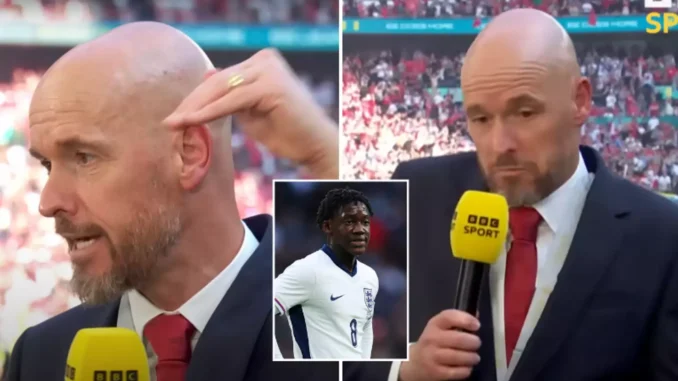Two weeks have passed since Erik ten Hag, the manager of Manchester United, appealed to fans in England to maintain their composure and allow young Kobbie Mainoo to develop at his own speed after the FA Cup final. Mainoo, a rising star for Manchester United last season, made a significant impact by scoring at Wembley on May 25, contributing to an unexpected triumph over Manchester City under ten Hag’s leadership.
Following Mainoo’s remarkable performance, Erik ten Hag faced questions about the young player’s potential from Alan Shearer, the former Newcastle striker and current BBC pundit. Ten Hag’s response was measured and cautious: “I think we have to keep it calm. You are very good here in England at pushing players and managers very high, and then you hammer them after one or two bad performances. I think we need to keep it very calm.”
Ten Hag elaborated on his perspective, emphasizing the need for patience with Mainoo’s development. “He was magnificent. It was really enjoyable to watch Kobbie at his age. But he’s also an example of the problems we face. We wanted to play him in the second game of the season, but then he got a bad injury. It took a long time for him to come back.”
Erik ten Hag’s words underscore the delicate balance required in nurturing young talent within the high-pressure environment of top-tier football. The manager’s comments reveal his awareness of the intense scrutiny that players face in England, where the media and fans can quickly elevate or criticize individuals based on their performances. His call for calm and patience is a reminder of the potential harm that excessive pressure and premature expectations can cause to a player’s career.
Mainoo’s journey is emblematic of the challenges young athletes encounter. Despite his exceptional abilities and impressive showing at a significant event like the FA Cup final, his progress has not been without setbacks. Ten Hag’s mention of Mainoo’s injury early in the season illustrates the unpredictability and vulnerability that come with professional sports. These injuries can derail even the most promising careers, and thus, the importance of a supportive and patient approach to a player’s development cannot be overstated.
Furthermore, ten Hag’s recognition of Mainoo’s talent at such a young age speaks volumes about the player’s potential. Yet, it also highlights the manager’s responsibility in shielding him from the overwhelming expectations that can accompany early success. The strategy is not just about protecting Mainoo but also about ensuring he has the space and time to mature into his role, without the additional burden of excessive scrutiny.
In conclusion, Erik ten Hag’s plea to the fans and media in England to remain calm and allow Kobbie Mainoo to grow at his own pace is rooted in a deep understanding of the pressures associated with professional football. His balanced approach aims to provide a nurturing environment for Mainoo, safeguarding his development while acknowledging his significant contributions to the team. This perspective is essential for fostering a sustainable and successful career for young talents like Mainoo in the competitive world of football.
